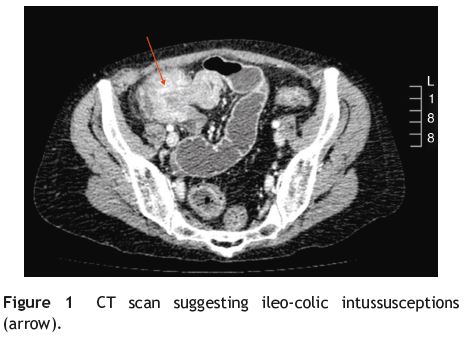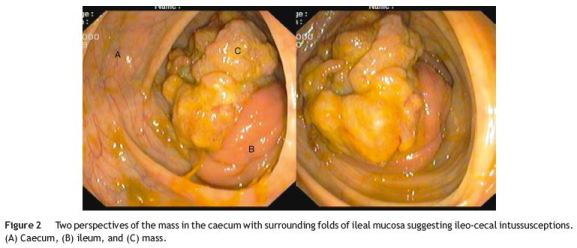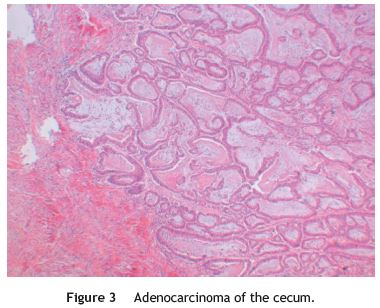Serviços Personalizados
Journal
Artigo
Indicadores
-
 Citado por SciELO
Citado por SciELO -
 Acessos
Acessos
Links relacionados
-
 Similares em
SciELO
Similares em
SciELO
Compartilhar
Jornal Português de Gastrenterologia
versão impressa ISSN 0872-8178
J Port Gastrenterol. vol.20 no.2 Lisboa mar. 2013
https://doi.org/10.1016/j.jpg.2012.07.009
Ileocecal intussusception secondary to cecal adenocarcinoma in the adult
Intussuscepção ileocecal secundária a um adenocarcinoma cecal no adulto
Rita Herculanoa,∗, Gilberto Coutoa, Luísa Monizb, Sofia Santosa, Leopoldo Matosa
a Serviço de Gastrenterologia, Centro Hospitalar de Lisboa Ocidental, Lisbon, Portugal
b Serviço de Cirurgia II, Centro Hospitalar de Lisboa Ocidental, Lisbon, Portugal
*Corresponding author.
Case report
We report the case of a 38-year-old man with unremarkable medical and family history. He had a four-month history of abdominal discomfort, namely intermittent abdominal cramping pain of mild to moderate severity in the middle and lower quadrants, and diarrhea with occasional traces of blood, unquantified weight loss and nausea, and without vomiting or abdominal distension. In the physical examination he had pain on deep palpation of the right iliac fossa. The CT scan suggested ileo-colic intussusception (Fig. 1), without any apparent underlying lesion. He was immediately referred for colonoscopy which showed a large, ulcerated, necrotic, and hard mass in the caecum with surrounding folds of ileal mucosa, suggesting ileo-cecal intussusception (Fig. 2). Biopsies revealed adenocarcinoma of the caecum. The patient underwent right ileo-colic resection and the pathology diagnosis (Fig. 3) was ileo-colic intussusception from adenocarcinoma of the caecum. None of the resected regional lymph nodes showed signs of malignancy (pT3N0). The different imaging methods did not show distant metastases. The postoperative period was uneventful and the patient was discharged and referred to Oncology consult.



Discussion
Intussusception is an uncommon cause of intestinal obstruction in adults. About 95% of all intussusceptions occur in children. Unlike these, adult intussusception is generally secondary to an organic lesion, malignant in 27-48% of the cases.1,2 The clinical presentation of adult intussusception is variable, with nonspecific symptoms (acute, intermittent, or more often chronic) making the preoperative diagnosis a challenge.1 CT scan is the best diagnostic tool,1 but the importance of colonoscopy in non-small bowel intussusceptions has been increasingly recognized.2,3 In our patient, the radiologic diagnosis was confirmed, and the cause of intussusceptions was identified by colonoscopy. An unusual feature of the presented case is the cause of ileo-colic intussusception which was an adenocarcinoma of the cecum. Overall, ileal causes are responsible for such intussusceptions. Unlike what happens in pediatrics, and given the malignant nature of the lesion, primary resection without a reduction effort is the treatment of choice in adults.1,3 However, in cases of benign enteric intussusceptions or when the primary resection involves a significant percentage of the bowel, reduction must be attempted.3
References
1. Azar T, Berger D. Adult intussusception. Ann Surg. 1997;226:134-8. [ Links ]
2. Wang N, Cui XY, Liu Y. Adult intussusception: a retrospective review of 41 cases. World J Gastrenterol. 2009;15: 3303-8. [ Links ]
3. Marinis A, Yiallourou A, Samanides L. Intussusception of the bowel in adults: a review. World J Gastrenterol. 2009;15:407-11. [ Links ]
Conflicts of interest
The authors have no conflicts of interest to declare.
*Corresponding author.
E-mail address: ritaherculano@hotmail.com (R. Herculano).
Received 8 January 2012; accepted 10 March 2012













